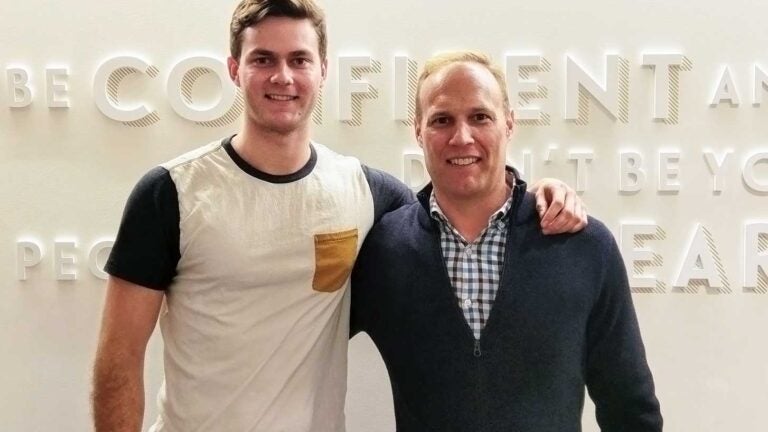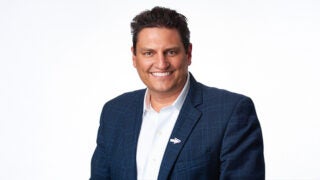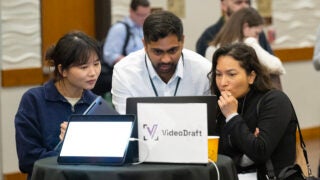
From startup to Google and beyond: Analytics expert takes on financial technology
Brett Crosby’s small company created software that led to the service tracking website analytics
His first venture after graduation didn’t pan out, but that didn’t smother the entrepreneurial spirit of Brett Crosby ’95.
Crosby, who graduated from the USC Dornsife College of Letters, Arts and Sciences, was drawn to startups.
“Even though I knew very little about starting companies,” he said, “I thought it was a much more interesting path.”
In 1997, Crosby, his brother Scott and fellow Trojan Jack Ancone ’95 co-founded a small company scooped up by Google in 2005. The company’s statistical software became the basis of Google Analytics, the service that tracks and reports website traffic.
Playing in the big leagues
“My head of sales at the time said, ‘It was like we were playing triple-A baseball and the Yankees called and said, “Hey, we’re going to be in the World Series, do you guys know how to pitch?”’ It did feel like that because we suddenly went from the backwaters of a small company to center stage at one of the largest and most important companies in the world.”
Crosby stayed on for close to a decade as Google’s director of product marketing, working on everything from the mobile advertising product to Google+, Chrome, Gmail, Docs and Drive. He watched the company grow from 2,500 people, when Google had just gone public, to upwards of 100,000 employees when he left in 2014.
Crosby has moved on to FinTech (financial technology) as chief operating officer and co-founder (along with USC Dornsife alumnuss Brew Johnson ’97 and Alex Perelman) of PeerStreet, an online platform for investing in real estate debt. By harnessing the power of big data analytics, the startup helps investors buy loans from existing lenders, Crosby explained, after carefully vetting both the lender and the loans. Lenders are usually small and private, as opposed to banks.
What we do is basically connect these lenders with the global capital markets on the other side of our platform. It’s like a stock market for investing in real estate debt.
Brett Crosby
“What we do is basically connect these lenders with the global capital markets on the other side of our platform,” he said. “It’s like a stock market for investing in real estate debt, and by doing that, all of a sudden lenders are able to double and triple their business without raising additional capital.
“Secondary markets like this end up being very, very important and allow industries to really flourish in ways they couldn’t before.”
Coming full circle at USC
Crosby remembers how much his university and study abroad experiences at USC Dornsife opened up his world. Professor Steven Lamy made a particular impression on him as an educator and mentor.
“Professor Lamy was one of my favorite professors by far,” he said. “The way he thinks about the world and the paradigms he taught me — how to think about things and understand different people’s points of view — is something that is very helpful for me to this day.”
Crosby, who now lives in Manhattan Beach with his wife and two daughters, speaks at USC often. He has spoken to classes in USC Dornsife’s Department of Economics as well as others in the USC Marshall School of Business.
The experience of speaking to students has been personally rewarding, he said, and has resulted in hiring USC alumni. It’s also led Crosby to expand mentorship opportunities. One class visit inspired a USC Dornsife economics major to approach Crosby to suggest he develop an internship program at PeerStreet. In 2016, the company did.
Entrepreneurism in Los Angeles
Crosby emphasizes to undergraduates that the entrepreneurial environment, particularly in L.A., has never been better. The city has venture capitalist firms that are competing with the Silicon Valley firms in a real way now, he said. Then there are all the feeder funds that are backing entrepreneurs inside and outside of USC.
The level of innovation and startup culture that is happening in L.A. is very exciting to me.
Brett Crosby
“The level of innovation and startup culture that is happening in L.A. is very exciting to me, and should be exciting for students that are getting close to graduating and thinking about what they want to do next. In my view, there’s never been a better time to be an entrepreneur in L.A.,” he said.
As an undergraduate, Crosby assumed that changing the world was done through protesting and politics. But he later came to the realization that if you really want to impact society, you should just go out there and — echoing Gandhi — make the change you want to see in the world.
“You don’t have to be an entrepreneurial student to become an entrepreneur or do something disruptive,” he said. “You don’t have to work for 30 years and become a specialist in a specific field. You just have to have ambition and awareness in looking for areas to improve society.”



